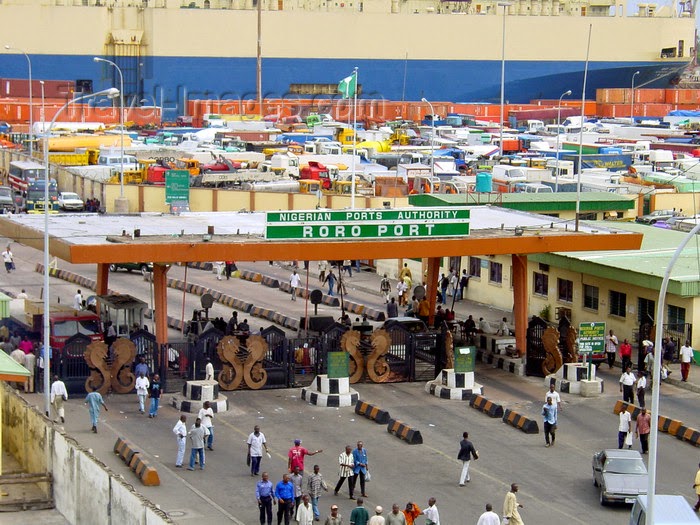Association of Nigeria (STOAN) has invested not less than a billion (N168
billion) in a bid to improve seaport operations services in the country since
the concessioning of the ports in 2006.
In spite of the huge investments, shippers and customs clearing agents have
always been raising concerns about some factors they perceive to be militating
against cargo clearance at the ports.
The situation has on many occasions been disagreements and even led to
industrial actions at the ports, which in many instances, triggered payments of
demurrage on goods not cleared in good time.
The industry stakeholders say the prevailing situations at the ports show that
a lot more ought to be done to make the ports competitive and attractive.
However, the ultimate desire is to develop the port to serve as the hub of
ports in the West African sub-region.
Prof. Iyiola Oni of the Department of Geography, University of Lagos, says
freight forwarders have faulted the concession regime, where terminal operators
are operating without any form of monitoring from government agencies.
Like Iyiola, the shippers and customs clearing agents appear worried that no
agency actually monitors standards to be maintained by the concessionaires.
The stakeholders insist that the Nigerian ports must be competitive when
compared to ports in neighbouring countries or else, the ports would continue
to experience cargo diversion to these nearby countries.
Apart from the problems of inadequate infrastructure, the importers are also
contending with the problem of high port charges.
Mr Bolaji Akinola, the spokesman of STOAN, says investments by terminal
operators are geared toward attaining efficiency by developing infrastructure
and manpower.
“The investments are meant to upgrade facilities, improve the training of the
workers, the acquisition of modern cargo handling equipment, as well as improve
the clearing processes at the ports”.
According to him, some importers may decide to use the ports in neighbouring
countries in order to evade duties or engage in smuggling of such goods across
the border.
“Some importers use ports in neighbouring countries because they want to
smuggle in their goods with a determined desire to beat government’s fiscal
policy.
“For example, you will see that there is a high rate of importation of vehicles
through the land borders; this is because they want to pay less duty,’’ Akinola
adds.
A maritime stakeholder, Mr David Etim, however, observes that virtually all the
nation’s borders are porous because of the high cost of doing business via the
country’s ports.
Also, Chief Kunle Folarin, the Chairman of the Nigerian Ports Consultative
Council (PCC), says effective port service delivery should first be considered
before pricing.
“Port system must first consider optimal service delivery by avoiding delays.
It means that modern infrastructure capable of supporting the cargo traffic,
24-hour cargo delivery, 24-hour vessel pilotage service, should be in place’’.
The President of the Shippers Association Lagos State (SALS), Mr Jonathan
Nicol, says Nigerian ports are failing in trade facilitation.
“The problems with our ports are diverse and require changes. The number of
government agencies at the ports should be reduced because we do not need a
whole village for container examination.
“A competitive port will facilitate trade, but the focus here is so much on
revenue generation,” says Nicol.
A lawyer, Mr Emeka Akabogu, who specilises on maritime issues, observes that
since the ports concessioning aims at promoting efficiency, they must be
supported by strong economic regulations.
Akabogu says there would be the need to control tariffs, provide free market
entry or exit and ensure that there would be fair and competitive behaviour and
practices within the sector.
The Minister of Transport, Sen. Idris Umar, while addressing stakeholders
recently on the issue of congestion at the ports, directed that vessels be
stemmed to other terminals in cases where they could not be handled in time, to
avoid delays.
Port operators were enjoined to work on holidays in order to ensure they
position containers for examination at least within 36 hours of booking.
Shippers, however, blame the terminal operators for inefficiencies in cargo
handling due to what they described as insufficient equipment and manpower.
Mr Fred Akokhia, the Deputy National President, National Association of
Government Approved Freight Forwarders (NAGAFF) believes: “Delays are sometimes
caused when you book containers for examination.
“In a situation where only one driver is working, having three cranes cannot
translate to efficiency ‘’.
While all more efforts are needed to hasten efficient service delivery, the
access roads into the ports would need to be improved upon.
it is believed that containers fall off moving trucks on several occasions
because of the many bad portion of roads that provide access routes to the
ports.
Some stakeholder have advised that there is the need to get back to the drawing
board in order to address all the problems bedeviling the ports sector, so as
to ultimately raise the profile of the Nigerian port as a hub port to the
sub-region.
Whether this will be achieved will depend on how committed all the stakeholders
work in a collaborative effort, to positively accomplish the objective in order
to maximize its anticipated socio-economic benefits.

